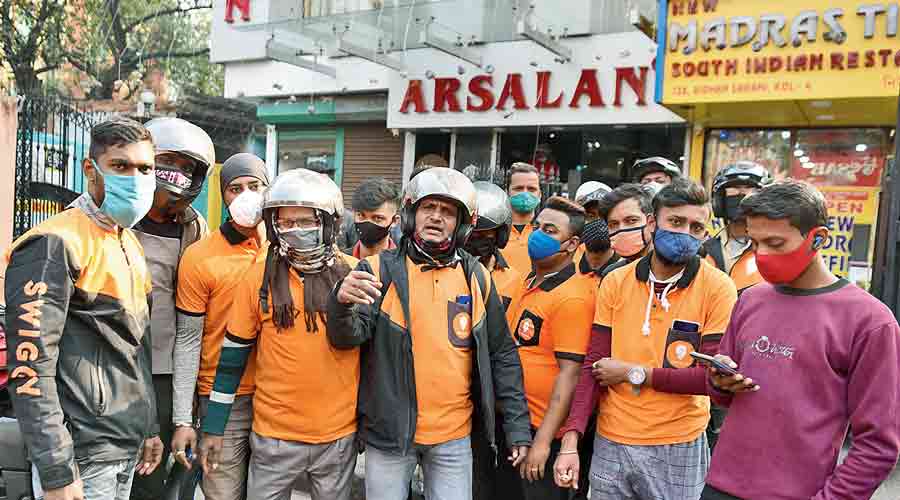Many Kolkatans complained that the food they had ordered on Swiggy was not delivered on Wednesday because a section of delivery executives went on strike pressing for higher pay and other demands.
Services were disrupted in Behala and Thakurpukur in southwest Kolkata, Nagerbazar and Hatibagan in north Kolkata besides some other places. Some parts of central Kolkata saw alleged disruptions on Thursday as well.
Accounts by different stakeholders suggested that grey areas of the gig economy, largely yet to be addressed in India, have started making an impact in the city, too.
The army of personnel — loosely called delivery boys — are not employees of the aggregators but “partners” who are not eligible for benefits such as employees provident fund and gratuity. But the gig economy is here to stay, and one academic suggested that raising user charges could be an option that helps the aggregator treat the delivery executives better.
Not all delivery personnel were part of the strike. But the protesters, stationed outside restaurants, did not allow others of the same aggregator to pick up food.
In multiple cases, the order was accepted before customers got to know about the “strike” from a delivery person. Those who had paid had their money refunded but they alleged lack of communication on Swiggy’s part.
In response to queries from The Telegraph, Swiggy sent a reply: “Swiggy is proud to enable a reliable and consistent earning opportunity for thousands of delivery partners in Kolkata. In the last 12 months, earnings per hour for Swiggy’s active delivery partners has grown by 25 -30 per cent and is among the best in the industry. Our partners also receive support in the form of medical and accident cover, life insurance, extended Covid cover, loss of income support in case of accident or Covid, legal and financial support among others.”
A resident of Behala in southwest Kolkata had ordered food from the James Long Sarani outlet of a Chinese food chain around 9pm on Wednesday. “My order was accepted. With 20 minutes left for delivery, I got a call from a delivery executive, who told me about the strike. He said he was not a participant but was not being allowed to pick up the order,” said the 37-year-old teacher.
A chat with a Swiggy executive on the app led to a refund, the teacher said. “But almost an hour went by. Swiggy should have at least sent a message on possible disruptions in some areas,” she said.
Restaurateurs acknowledged the disruptions. “The Swiggy delivery services from our outlets in Behala, Nagerbazar, Hatibagan, Barrackpore and Sodepur were affected,” said Kabir Azhar of Aminia Restaurants.
Shiladitya Chaudhury of Oudh 1590 said the Salt Lake and Jessore Road outlets saw similar disruptions. The key demands of protesters — higher pay and bar on outsourcing.
“I get a base amount of Rs 20 for every order up to 4km. But effectively, it comes down to Rs 20 for 8km as I hardly get an order on my way back from a customer’s house. There is an additional Rs 5 for every kilometre. When petrol costs over Rs 100 per litre, it is impossible to carry on like this,” said a delivery person in Behala.
“Till a few days ago, I used to get an incentive on delivering 14, 18 and 24 orders every day. The incentive was stopped abruptly,” a delivery person in central Kolkata alleged.
Another delivery person, stationed outside the Bidhan Sarani outlet of a biryani chain in north Kolkata on Thursday, alleged that the aggregator had started “outsourcing” orders to personnel of other delivery apps. “Swiggy gets a commission from these agents. The company is making profits but our condition has worsened.”
The pandemic has increased people’s dependence on online food aggregators. Online food delivery is considered an “essential service” exempt from night curfew.
The large-scale loss of livelihood triggered by the pandemic has also led to a surge in the number of people taking up jobs as delivery executives of these aggregators.
A two-wheeler, a driving licence and a smartphone are the key requirements for the job. Although the personnel are considered “partners”, which forecloses benefits usually found in traditional jobs, many take up the delivery service in the hope that they would eventually be inducted as employees.
The rights of gig workers are a raging debate in the West. Uber drivers must be treated as workers rather than self-employed, the UK's Supreme Court ruled in February 2021, an order seen with wide-ranging implications.
The European Union is also mulling legislation to ensure minimum wage, access to sick pay, holidays and other employment rights for gig workers.
Anup Sinha, a former teacher of economics at IIM Calcutta, suggested the aggregators raise their delivery charges to treat their executives better.
“The people who order through food aggregators are saving on fuel (expense of driving to the restaurant). They are also saving time — being able to work on an office project and have the food right in front of the laptop. Considering all these, I don’t think they would mind paying a little more for every order. The aggregators can raise their delivery charges to treat their executives better,” Sinha said.
